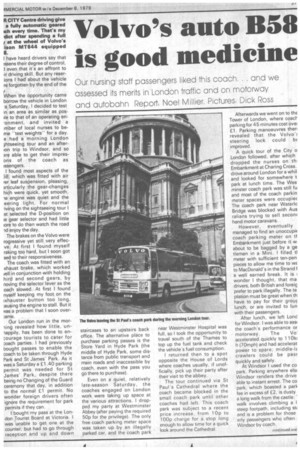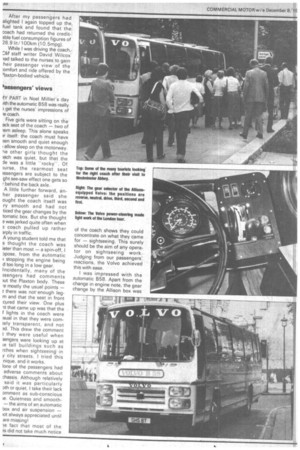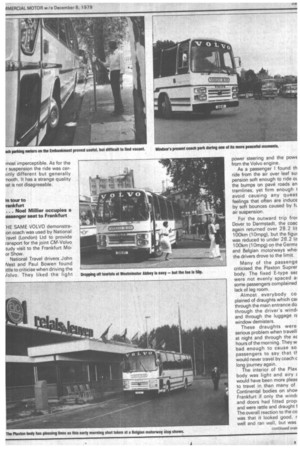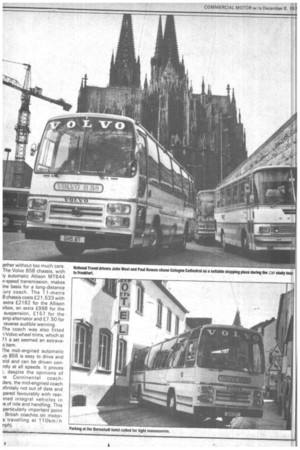Volvo's auto 1158 is good medicine
Page 39

Page 40

Page 41

Page 42

If you've noticed an error in this article please click here to report it so we can fix it.
Our nursing staff passengers liked this coach, and we assessed its merits in London traffic and on motorway and autobahn Repot Noel Millie'', Pictures, Dick Ross
R CITY Centre driving give' a fully automatic geared och every time. That's my .dict after spending a full f at the wheel of Volvo's lison MT644 equipped 8.
I have heard drivers say that ?ssens their degree of control,
even that it's an affront to ljr driving skill. But any reserions I had about the vehicle re forgotten by the end of the When the opportunity came borrow the vehicle in London a Saturday, I decided to test in an area as similar as pos)Ie to that of an operating en-onment, and invited a imber of local nurses to beme ''test weightsfor a day. e had a morning London jhtseeing tour and an afterion trip to Windsor, and so are able to get their 'moresons of the coach as issengers.
I found most aspects of the 38, which was fitted with air ler leaf suspension, pleasing, 3rticularly the gear-changes hich were quick, yet smooth. -le engine was quiet and the eering light. For normal iving on the sightseeing tour I ist selected the 0-position on le gear selector and had little lore to do than watch the road 'Id enjoy the day.
The brakes on the Volvo were rogressive yet still very effecve. At first I found myself raking too hard, but I soon got sed to their responsiveness. The coach was fitted with an xhaust brake, which worked yell in conjunction with holding hird and second gears, by noving the selector lever as the nach slowed. At first I found nyself keeping my foot on the Dthauster button too long, :ausing the engine to stall. But it as a problem that I soon over
Our London run in the morling revealed how little, unlappily, has been done to encourage tourists to cater for coach parties. I had previously bought passes to enable the coach to be taken through Hyde Park and St James' Park. As it was a Saturday a £1.40 parking permit was needed for St James' Park, despite there being no Changing of the Guard ceremony that day, in addition to the normal El permit. No wonder foreign drivers often ignore the requirement for park permits if they can.
I bought my pass at the London Tourist Board at Victoria. I was unable to get one at the counter, but had to go through reception and up and down staircases to an upstairs back office. The alternative place to purchase parking passes is the Store Yard in Hyde Park (the middle of Hyde Park, some distance from public transport and main roads and inaccessible by coach, even with the pass you go there to purchase).
Even on a quiet, relatively late-season Saturday, the coaches engaged on London work were taking up space at the various attractions. I dropped my party at Westminster Abbey (after paying the required 50p for the privilege). The only free coach parking meter space was taken up by an illegally parked car, and the coach park near Westminster Hospital was full, so I took the opportunity to travel south of the Thames to top up the fuel tank and check the vehicle's fuel consumption.
I returned then to a spot opposite the House of Lords where coaches usually, if unofficially, pick up their party after their visit to the abbey.
The tour continued via St Paul's Cathedral where the coach became blocked in the small coach park until other coaches had left. This coach park was subject to a recent price increase, from 10p to 100p charge for a stop long enough to allow time for a quick look around the Cathedral. Afterwards we went on to thE
Tower of London, where coactparking for 45 minutes cost over £1. Parking manoeuvres ther, revealed that the Volvo' steering lock could b( improved.
A quick tour of the City o
London followed, after which dropped the nurses on th, Embankment at Charing Cross, drove around London for a whil and looked for somewhere t park at lunch time. The Wes.
minster coach park was still fu and most of the coach parkin meter spaces were occupiec The coach park near Waterlic Bridge was blocked with Aus ralians trying to sell secon( hand motor caravans.
. However, eventually managed to find an unoccupi( coach parking meter on tF Embankment just before it w. about to be bagged by a ge tleman in a Mini. I filled tl meter with sufficient ten-pen pieces to allow me time to vimto MacDonald's in the Strand f a well earned break. It is wonder I thought, that ma drivers, both British and foreig prefer to park illegally. The te ptation must be great when th have to pay for their grour lunch, or are invited to lun with their passengers.
After lunch, we left Lond for Windsor. I was able to ass' the coach's performance or motorway. The Vol accelerated, quickly to 110k, h (70mph) and had accelerat power to spare; middle-IE crawlers could be past quickly and safely.
At Windsor I used the co park. Parking anywhere els( Windsor renders the drive able to instant arrest. The co park, which boasted a park fee in excess of £2, is dusty a long walk from the castle. walk involves climbing a I steep footpath, including sv and is a problem for those erly passengers who often Windsor by coach,
After my passengers had 'lighted I again topped up the, uel tank and found that the oach had returned the credit-. ible fuel consumption figures of !6.9 lit/100km (10.5mpg).
While I was driving the coach,' ;/14 staff writer David Wilcox' lad talked to the nurses to gain heir passenger view of the omfort and ride offered by the 'Iaxton-bodied vehicle.
'assengers' views
IY PART in Noel Millier's day rith the automatic 858 was really. ) get the nurses' impressions of le coach.
Five girls were sitting on the ack seat of the coach — two of lem asleep. This alone speaks )r itself: the coach must have aen smooth and quiet enough allow sleep on the motorway. le other girls • thought the )ach was quiet, but that the Je was a little "rocky". Of )urse, the rearmost seat )ssengers are subject to the ght see-saw effect one gets so behind the back axle.
A little further forward, anher passenger said she ought the coach itself was ry smooth and had not ticed the gear changes by the tomatic box, But she thought a was jerked quite often when 3 coach pulled up rather 3rply in traffic.
A young student told me that e thought the coach was ieter than most — a spin-off, I ppose, from the automatic < stopping the engine being d too long in a low gear.
Incidentally, many of the isengers had comments )ut the Plaxton body. These
-a mostly the usual points —
t there was not' enough leg m and that the seat in front cured their view. One plus it that came up was that the I lights in the coach were lsual in that they were corntely transparent, and not )d. This drew the comment t they were useful when 3engers were looking up at ;e tall buildings such as rches when sightseeing in y city streets. I tried this nique, and it works.
lone of the passengers had adverse comments about ahassis. Although relatively said it was particularly oth or quiet, I take their lack omment as sub-conscious ;e. Quietness and smooththe aims of an automatic box and air suspension — lot always appreciated until are missing!
-le fact that most of the did not take much notice
of the coach shows they could concentrate on what they came for — sightseeing. This surely should be the aim of any operator on sightseeing work. Judging from our passengers' reactions, the Volvo achieved this with ease.
I was impressed with the automatic B58. Apart from the change in engine note, the gear change by the Allison box was
most imperceptible. As for the r suspension the ride was ceriinly different but generally -nooth. It has a strange quality rat is not disagreeable.
HE SAME VOLVO demonstraion coach was used by National 'ravel (London) Ltd to provide ransport for the joint CM-Volvo ludy visit to the Frankfurt Moor Show.
National Travel drivers John Nest and Paul Bowen found ittle to criticise when driving the Jolvo. They liked the light power steering and the powE from the Volvo engine.
As a passenger I found th ride from the air over leaf su! pension soft enough to ride ot the bumps on pave roads an tramlines, yet firm enough t avoid causing any queas feelings that often are induce by soft bounces caused by fL air suspension.
For the outward trip fror Dover to Darmstadt, the coac again returned over 28.2 lit 100km (10mpg), but the fig ui was reduced to under 28.2 lit 100km (10mpg) on the GermE and Belgian motorways whei the drivers drove to the limit.
Many of the passenge criticised the Plaxton Suprer body. The fixed E-type seE were not evenly spaced al some passengers complained lack of leg room.
Almost everybody co plained of draughts which car through the main entrance do through the driver's wind( and through the luggage rE window demisters.
These draughts were serious problem when travel!: at night and through the eE hours of the morning. They w bad enough to cause so passengers to say that would never travel by coach c long journey again.
The interior of the Plax body was light and airy would have been more pleas to travel in than many of Continental bodies on sho‘n Frankfurt if only the wind( and doors had fitted prop, and were rattle and draught i The overall reaction to the co was that it looked good, r well and ran well, but was
;ether without too much care. The Volvo B58 chassis, with ly automatic Allison MT644 ir-speed transmission, makes ine basis for a long-distance :ury coach. The 11-metre 8 chassis costs £21,533 with extra £2182 for the Allison irbox, an extra £998 for the suspension, £157 for the amp alternator and £7.50 for reverse audible warning,
[he coach was also fitted 1Volvo wheel trims, which at 71 a set seemed an extravait item,
rhe mid-engined automatic vo 658 is easy to drive and trol and can be driven con ntly at all speeds. It proves t, despite the opinions of le Continental coachders, the mid-engined coach finitely not out of date and 'pared favourably with rearined integral vehicles in is of ride and handling. This particularly important point British coaches on motors travelling at 110km /11 nph).
























































































































































